Comprehensive Report: Entrepreneurship and Small Business Ventures
VerifiedAdded on 2020/06/03
|14
|4634
|50
Report
AI Summary
This report provides a comprehensive analysis of entrepreneurship and small business management. It begins by defining entrepreneurship and exploring different types of ventures, including small business entrepreneurship, social entrepreneurship, lifestyle ventures, trading entrepreneurs, industrial entrepreneurship, and large-size entrepreneurship. The report then delves into the similarities and dissimilarities between various entrepreneurial models, such as public versus corporate entrepreneurship. It analyzes the impact of micro and small businesses on the economy, highlighting their contributions to employment, economic growth, flexibility, and revenue generation. Furthermore, it examines the importance of small businesses and start-ups to the social economy, focusing on wealth creation and job opportunities. The report also identifies the characteristic traits and skills of successful entrepreneurs, differentiating them from traditional business managers, and explores the aspects that demonstrate entrepreneurial personality and motivation. Finally, it evaluates how past experiences can assist or hinder an entrepreneur's performance, providing a holistic view of the entrepreneurial journey.

Entrepreneurship and
Small Business
Management
Small Business
Management
Paraphrase This Document
Need a fresh take? Get an instant paraphrase of this document with our AI Paraphraser
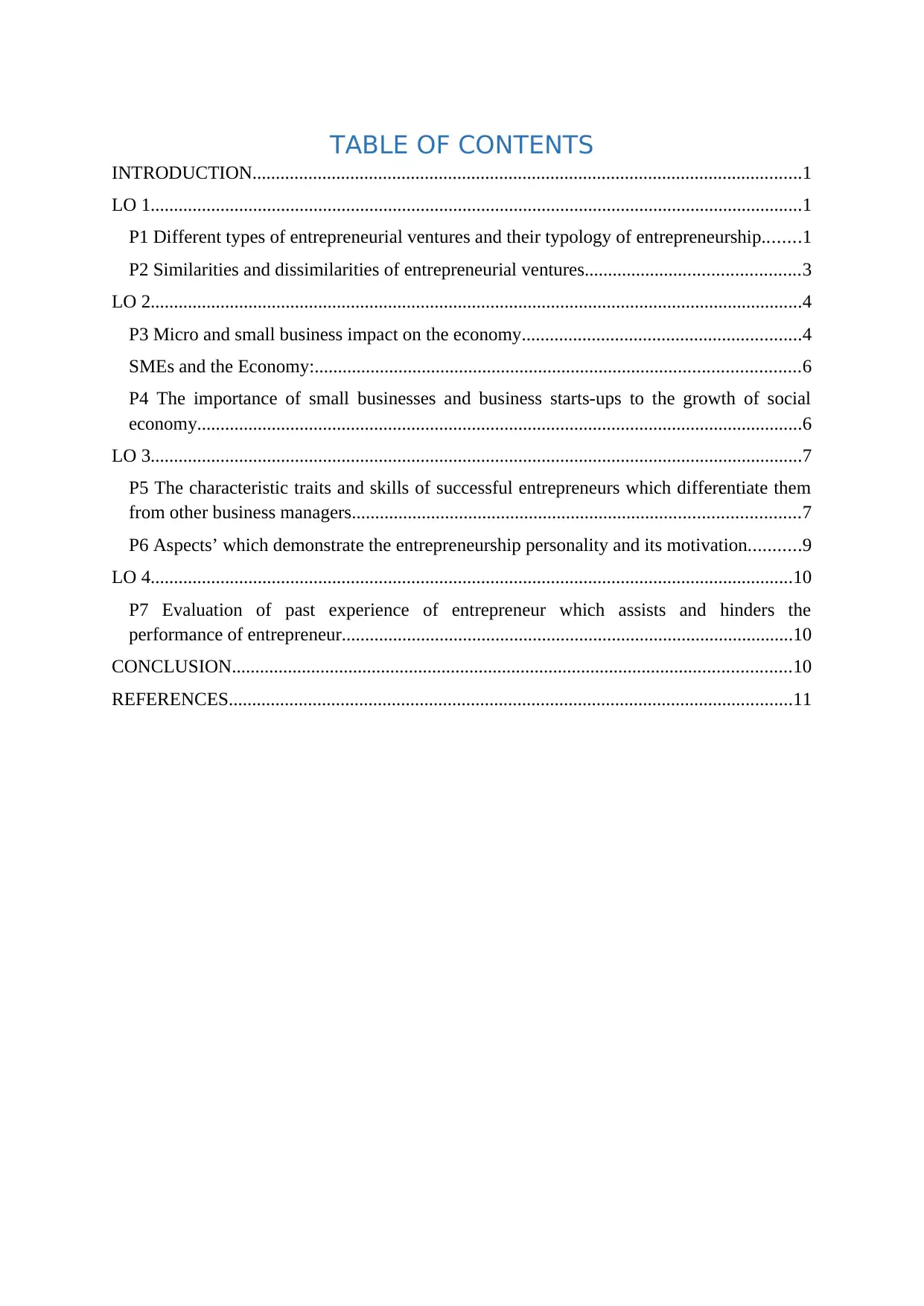
TABLE OF CONTENTS
INTRODUCTION......................................................................................................................1
LO 1............................................................................................................................................1
P1 Different types of entrepreneurial ventures and their typology of entrepreneurship........1
P2 Similarities and dissimilarities of entrepreneurial ventures..............................................3
LO 2............................................................................................................................................4
P3 Micro and small business impact on the economy............................................................4
SMEs and the Economy:........................................................................................................6
P4 The importance of small businesses and business starts-ups to the growth of social
economy..................................................................................................................................6
LO 3............................................................................................................................................7
P5 The characteristic traits and skills of successful entrepreneurs which differentiate them
from other business managers................................................................................................7
P6 Aspects’ which demonstrate the entrepreneurship personality and its motivation...........9
LO 4..........................................................................................................................................10
P7 Evaluation of past experience of entrepreneur which assists and hinders the
performance of entrepreneur.................................................................................................10
CONCLUSION........................................................................................................................10
REFERENCES.........................................................................................................................11
INTRODUCTION......................................................................................................................1
LO 1............................................................................................................................................1
P1 Different types of entrepreneurial ventures and their typology of entrepreneurship........1
P2 Similarities and dissimilarities of entrepreneurial ventures..............................................3
LO 2............................................................................................................................................4
P3 Micro and small business impact on the economy............................................................4
SMEs and the Economy:........................................................................................................6
P4 The importance of small businesses and business starts-ups to the growth of social
economy..................................................................................................................................6
LO 3............................................................................................................................................7
P5 The characteristic traits and skills of successful entrepreneurs which differentiate them
from other business managers................................................................................................7
P6 Aspects’ which demonstrate the entrepreneurship personality and its motivation...........9
LO 4..........................................................................................................................................10
P7 Evaluation of past experience of entrepreneur which assists and hinders the
performance of entrepreneur.................................................................................................10
CONCLUSION........................................................................................................................10
REFERENCES.........................................................................................................................11
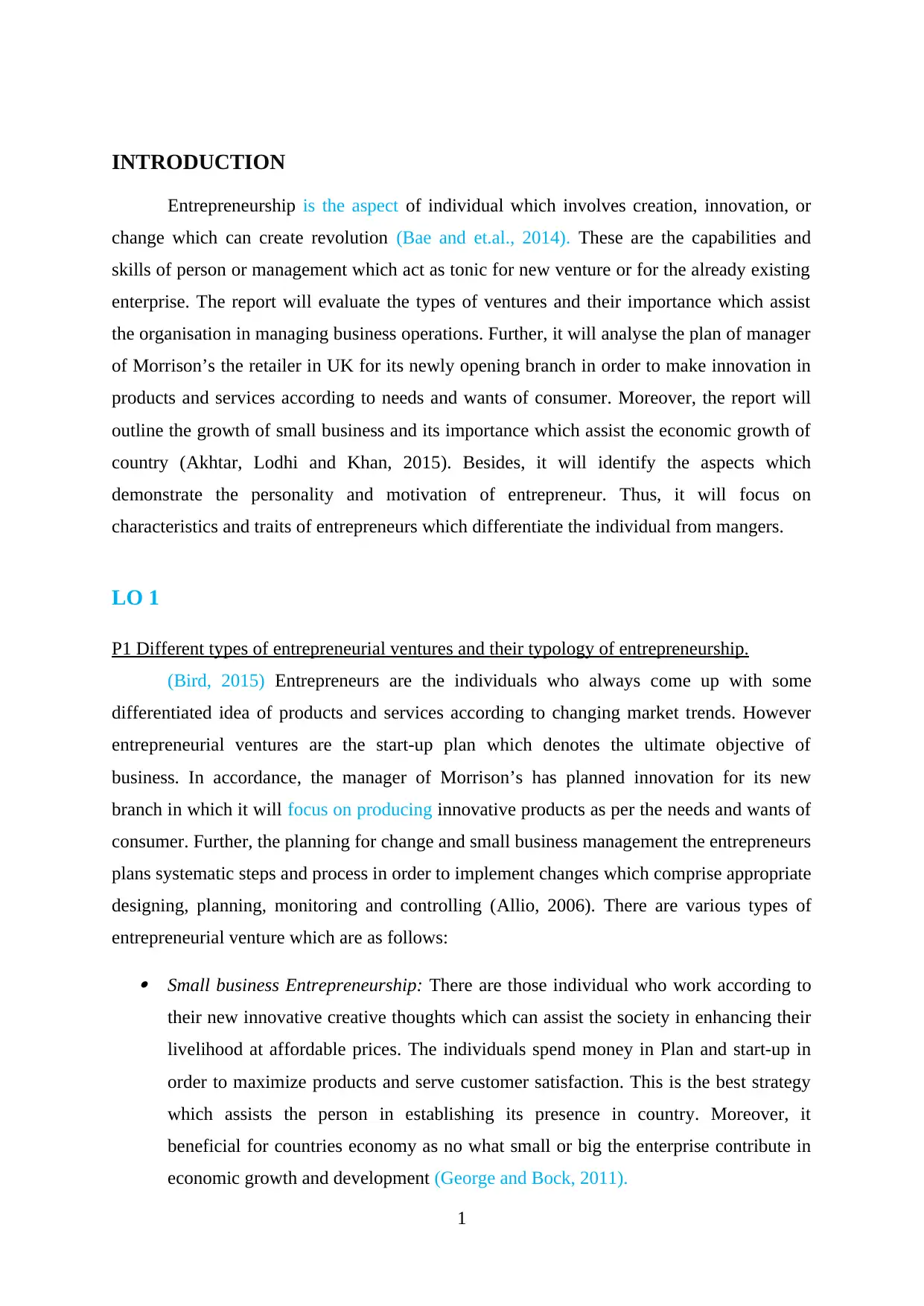
INTRODUCTION
Entrepreneurship is the aspect of individual which involves creation, innovation, or
change which can create revolution (Bae and et.al., 2014). These are the capabilities and
skills of person or management which act as tonic for new venture or for the already existing
enterprise. The report will evaluate the types of ventures and their importance which assist
the organisation in managing business operations. Further, it will analyse the plan of manager
of Morrison’s the retailer in UK for its newly opening branch in order to make innovation in
products and services according to needs and wants of consumer. Moreover, the report will
outline the growth of small business and its importance which assist the economic growth of
country (Akhtar, Lodhi and Khan, 2015). Besides, it will identify the aspects which
demonstrate the personality and motivation of entrepreneur. Thus, it will focus on
characteristics and traits of entrepreneurs which differentiate the individual from mangers.
LO 1
P1 Different types of entrepreneurial ventures and their typology of entrepreneurship.
(Bird, 2015) Entrepreneurs are the individuals who always come up with some
differentiated idea of products and services according to changing market trends. However
entrepreneurial ventures are the start-up plan which denotes the ultimate objective of
business. In accordance, the manager of Morrison’s has planned innovation for its new
branch in which it will focus on producing innovative products as per the needs and wants of
consumer. Further, the planning for change and small business management the entrepreneurs
plans systematic steps and process in order to implement changes which comprise appropriate
designing, planning, monitoring and controlling (Allio, 2006). There are various types of
entrepreneurial venture which are as follows:
Small business Entrepreneurship: There are those individual who work according to
their new innovative creative thoughts which can assist the society in enhancing their
livelihood at affordable prices. The individuals spend money in Plan and start-up in
order to maximize products and serve customer satisfaction. This is the best strategy
which assists the person in establishing its presence in country. Moreover, it
beneficial for countries economy as no what small or big the enterprise contribute in
economic growth and development (George and Bock, 2011).
1
Entrepreneurship is the aspect of individual which involves creation, innovation, or
change which can create revolution (Bae and et.al., 2014). These are the capabilities and
skills of person or management which act as tonic for new venture or for the already existing
enterprise. The report will evaluate the types of ventures and their importance which assist
the organisation in managing business operations. Further, it will analyse the plan of manager
of Morrison’s the retailer in UK for its newly opening branch in order to make innovation in
products and services according to needs and wants of consumer. Moreover, the report will
outline the growth of small business and its importance which assist the economic growth of
country (Akhtar, Lodhi and Khan, 2015). Besides, it will identify the aspects which
demonstrate the personality and motivation of entrepreneur. Thus, it will focus on
characteristics and traits of entrepreneurs which differentiate the individual from mangers.
LO 1
P1 Different types of entrepreneurial ventures and their typology of entrepreneurship.
(Bird, 2015) Entrepreneurs are the individuals who always come up with some
differentiated idea of products and services according to changing market trends. However
entrepreneurial ventures are the start-up plan which denotes the ultimate objective of
business. In accordance, the manager of Morrison’s has planned innovation for its new
branch in which it will focus on producing innovative products as per the needs and wants of
consumer. Further, the planning for change and small business management the entrepreneurs
plans systematic steps and process in order to implement changes which comprise appropriate
designing, planning, monitoring and controlling (Allio, 2006). There are various types of
entrepreneurial venture which are as follows:
Small business Entrepreneurship: There are those individual who work according to
their new innovative creative thoughts which can assist the society in enhancing their
livelihood at affordable prices. The individuals spend money in Plan and start-up in
order to maximize products and serve customer satisfaction. This is the best strategy
which assists the person in establishing its presence in country. Moreover, it
beneficial for countries economy as no what small or big the enterprise contribute in
economic growth and development (George and Bock, 2011).
1
⊘ This is a preview!⊘
Do you want full access?
Subscribe today to unlock all pages.

Trusted by 1+ million students worldwide
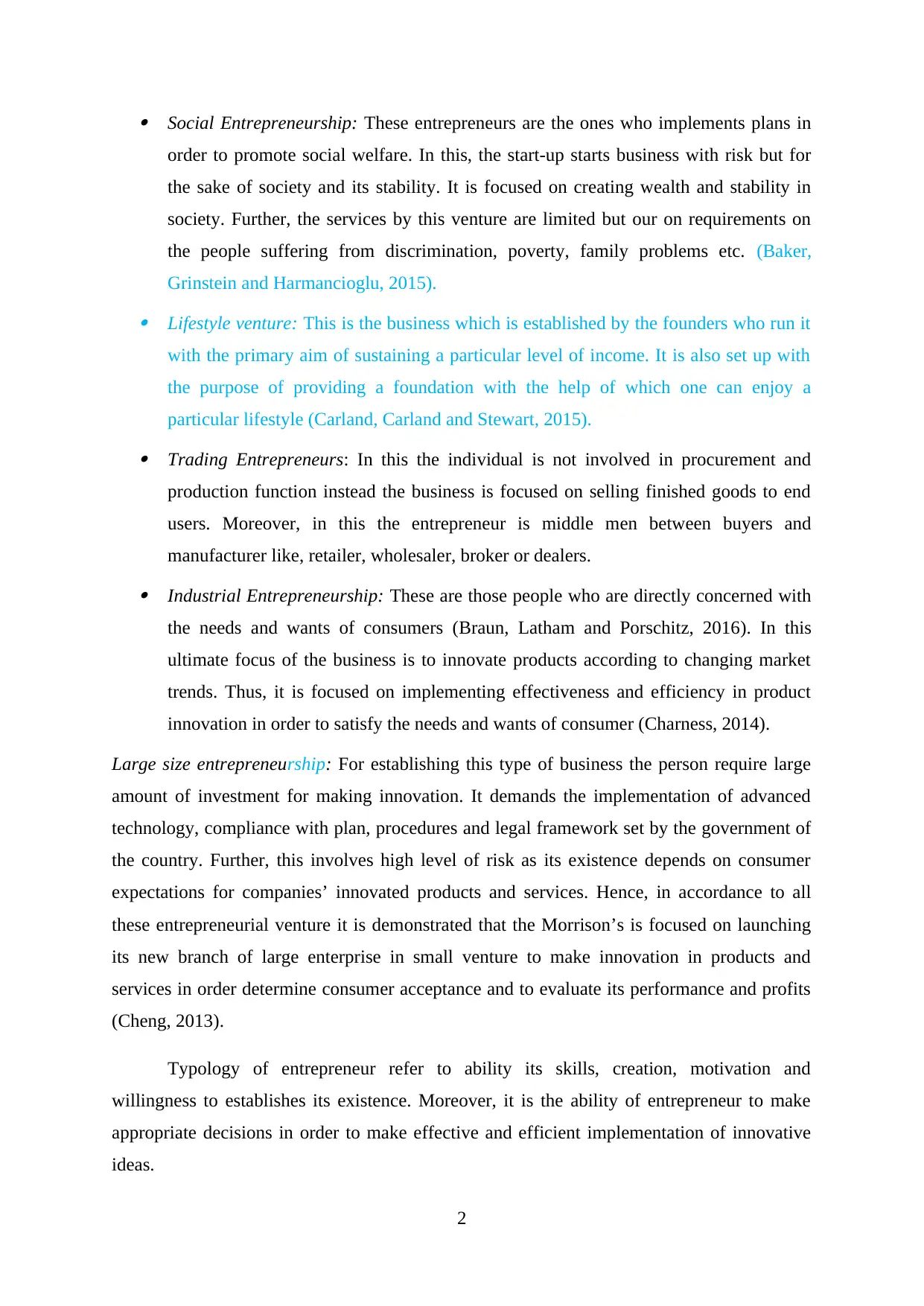
Social Entrepreneurship: These entrepreneurs are the ones who implements plans in
order to promote social welfare. In this, the start-up starts business with risk but for
the sake of society and its stability. It is focused on creating wealth and stability in
society. Further, the services by this venture are limited but our on requirements on
the people suffering from discrimination, poverty, family problems etc. (Baker,
Grinstein and Harmancioglu, 2015). Lifestyle venture: This is the business which is established by the founders who run it
with the primary aim of sustaining a particular level of income. It is also set up with
the purpose of providing a foundation with the help of which one can enjoy a
particular lifestyle (Carland, Carland and Stewart, 2015). Trading Entrepreneurs: In this the individual is not involved in procurement and
production function instead the business is focused on selling finished goods to end
users. Moreover, in this the entrepreneur is middle men between buyers and
manufacturer like, retailer, wholesaler, broker or dealers. Industrial Entrepreneurship: These are those people who are directly concerned with
the needs and wants of consumers (Braun, Latham and Porschitz, 2016). In this
ultimate focus of the business is to innovate products according to changing market
trends. Thus, it is focused on implementing effectiveness and efficiency in product
innovation in order to satisfy the needs and wants of consumer (Charness, 2014).
Large size entrepreneurship: For establishing this type of business the person require large
amount of investment for making innovation. It demands the implementation of advanced
technology, compliance with plan, procedures and legal framework set by the government of
the country. Further, this involves high level of risk as its existence depends on consumer
expectations for companies’ innovated products and services. Hence, in accordance to all
these entrepreneurial venture it is demonstrated that the Morrison’s is focused on launching
its new branch of large enterprise in small venture to make innovation in products and
services in order determine consumer acceptance and to evaluate its performance and profits
(Cheng, 2013).
Typology of entrepreneur refer to ability its skills, creation, motivation and
willingness to establishes its existence. Moreover, it is the ability of entrepreneur to make
appropriate decisions in order to make effective and efficient implementation of innovative
ideas.
2
order to promote social welfare. In this, the start-up starts business with risk but for
the sake of society and its stability. It is focused on creating wealth and stability in
society. Further, the services by this venture are limited but our on requirements on
the people suffering from discrimination, poverty, family problems etc. (Baker,
Grinstein and Harmancioglu, 2015). Lifestyle venture: This is the business which is established by the founders who run it
with the primary aim of sustaining a particular level of income. It is also set up with
the purpose of providing a foundation with the help of which one can enjoy a
particular lifestyle (Carland, Carland and Stewart, 2015). Trading Entrepreneurs: In this the individual is not involved in procurement and
production function instead the business is focused on selling finished goods to end
users. Moreover, in this the entrepreneur is middle men between buyers and
manufacturer like, retailer, wholesaler, broker or dealers. Industrial Entrepreneurship: These are those people who are directly concerned with
the needs and wants of consumers (Braun, Latham and Porschitz, 2016). In this
ultimate focus of the business is to innovate products according to changing market
trends. Thus, it is focused on implementing effectiveness and efficiency in product
innovation in order to satisfy the needs and wants of consumer (Charness, 2014).
Large size entrepreneurship: For establishing this type of business the person require large
amount of investment for making innovation. It demands the implementation of advanced
technology, compliance with plan, procedures and legal framework set by the government of
the country. Further, this involves high level of risk as its existence depends on consumer
expectations for companies’ innovated products and services. Hence, in accordance to all
these entrepreneurial venture it is demonstrated that the Morrison’s is focused on launching
its new branch of large enterprise in small venture to make innovation in products and
services in order determine consumer acceptance and to evaluate its performance and profits
(Cheng, 2013).
Typology of entrepreneur refer to ability its skills, creation, motivation and
willingness to establishes its existence. Moreover, it is the ability of entrepreneur to make
appropriate decisions in order to make effective and efficient implementation of innovative
ideas.
2
Paraphrase This Document
Need a fresh take? Get an instant paraphrase of this document with our AI Paraphraser
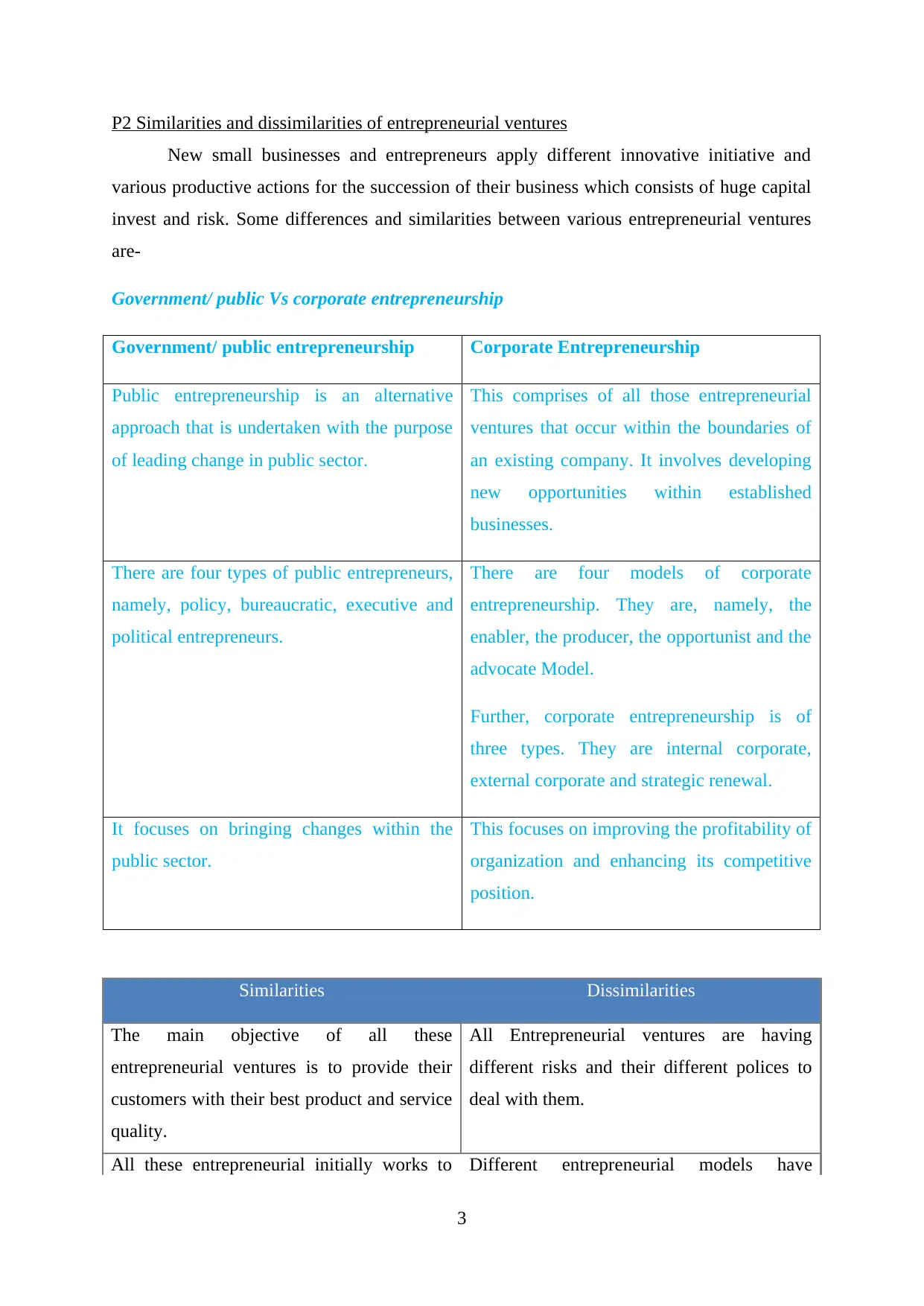
P2 Similarities and dissimilarities of entrepreneurial ventures
New small businesses and entrepreneurs apply different innovative initiative and
various productive actions for the succession of their business which consists of huge capital
invest and risk. Some differences and similarities between various entrepreneurial ventures
are-
Government/ public Vs corporate entrepreneurship
Government/ public entrepreneurship Corporate Entrepreneurship
Public entrepreneurship is an alternative
approach that is undertaken with the purpose
of leading change in public sector.
This comprises of all those entrepreneurial
ventures that occur within the boundaries of
an existing company. It involves developing
new opportunities within established
businesses.
There are four types of public entrepreneurs,
namely, policy, bureaucratic, executive and
political entrepreneurs.
There are four models of corporate
entrepreneurship. They are, namely, the
enabler, the producer, the opportunist and the
advocate Model.
Further, corporate entrepreneurship is of
three types. They are internal corporate,
external corporate and strategic renewal.
It focuses on bringing changes within the
public sector.
This focuses on improving the profitability of
organization and enhancing its competitive
position.
Similarities Dissimilarities
The main objective of all these
entrepreneurial ventures is to provide their
customers with their best product and service
quality.
All Entrepreneurial ventures are having
different risks and their different polices to
deal with them.
All these entrepreneurial initially works to Different entrepreneurial models have
3
New small businesses and entrepreneurs apply different innovative initiative and
various productive actions for the succession of their business which consists of huge capital
invest and risk. Some differences and similarities between various entrepreneurial ventures
are-
Government/ public Vs corporate entrepreneurship
Government/ public entrepreneurship Corporate Entrepreneurship
Public entrepreneurship is an alternative
approach that is undertaken with the purpose
of leading change in public sector.
This comprises of all those entrepreneurial
ventures that occur within the boundaries of
an existing company. It involves developing
new opportunities within established
businesses.
There are four types of public entrepreneurs,
namely, policy, bureaucratic, executive and
political entrepreneurs.
There are four models of corporate
entrepreneurship. They are, namely, the
enabler, the producer, the opportunist and the
advocate Model.
Further, corporate entrepreneurship is of
three types. They are internal corporate,
external corporate and strategic renewal.
It focuses on bringing changes within the
public sector.
This focuses on improving the profitability of
organization and enhancing its competitive
position.
Similarities Dissimilarities
The main objective of all these
entrepreneurial ventures is to provide their
customers with their best product and service
quality.
All Entrepreneurial ventures are having
different risks and their different polices to
deal with them.
All these entrepreneurial initially works to Different entrepreneurial models have
3
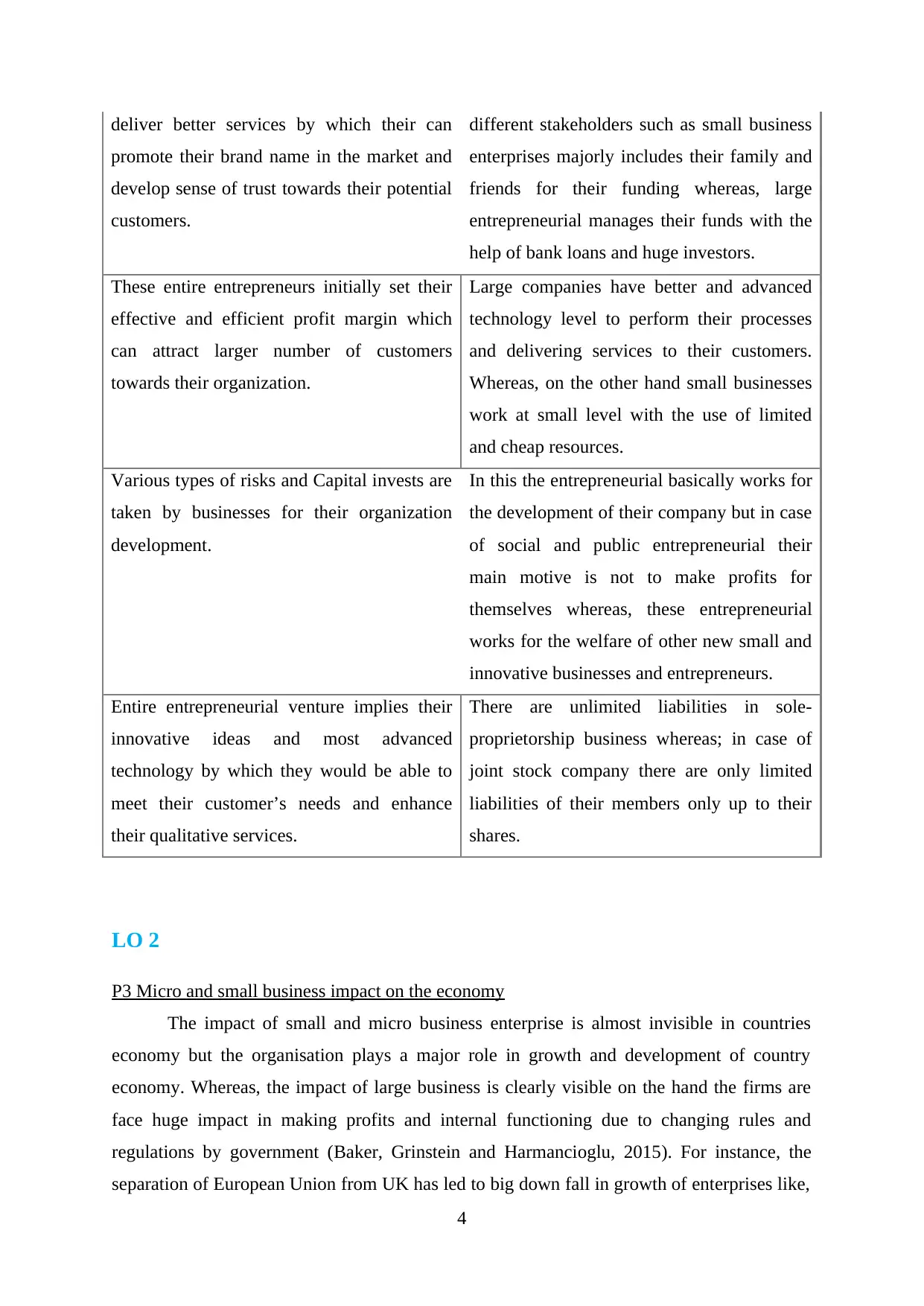
deliver better services by which their can
promote their brand name in the market and
develop sense of trust towards their potential
customers.
different stakeholders such as small business
enterprises majorly includes their family and
friends for their funding whereas, large
entrepreneurial manages their funds with the
help of bank loans and huge investors.
These entire entrepreneurs initially set their
effective and efficient profit margin which
can attract larger number of customers
towards their organization.
Large companies have better and advanced
technology level to perform their processes
and delivering services to their customers.
Whereas, on the other hand small businesses
work at small level with the use of limited
and cheap resources.
Various types of risks and Capital invests are
taken by businesses for their organization
development.
In this the entrepreneurial basically works for
the development of their company but in case
of social and public entrepreneurial their
main motive is not to make profits for
themselves whereas, these entrepreneurial
works for the welfare of other new small and
innovative businesses and entrepreneurs.
Entire entrepreneurial venture implies their
innovative ideas and most advanced
technology by which they would be able to
meet their customer’s needs and enhance
their qualitative services.
There are unlimited liabilities in sole-
proprietorship business whereas; in case of
joint stock company there are only limited
liabilities of their members only up to their
shares.
LO 2
P3 Micro and small business impact on the economy
The impact of small and micro business enterprise is almost invisible in countries
economy but the organisation plays a major role in growth and development of country
economy. Whereas, the impact of large business is clearly visible on the hand the firms are
face huge impact in making profits and internal functioning due to changing rules and
regulations by government (Baker, Grinstein and Harmancioglu, 2015). For instance, the
separation of European Union from UK has led to big down fall in growth of enterprises like,
4
promote their brand name in the market and
develop sense of trust towards their potential
customers.
different stakeholders such as small business
enterprises majorly includes their family and
friends for their funding whereas, large
entrepreneurial manages their funds with the
help of bank loans and huge investors.
These entire entrepreneurs initially set their
effective and efficient profit margin which
can attract larger number of customers
towards their organization.
Large companies have better and advanced
technology level to perform their processes
and delivering services to their customers.
Whereas, on the other hand small businesses
work at small level with the use of limited
and cheap resources.
Various types of risks and Capital invests are
taken by businesses for their organization
development.
In this the entrepreneurial basically works for
the development of their company but in case
of social and public entrepreneurial their
main motive is not to make profits for
themselves whereas, these entrepreneurial
works for the welfare of other new small and
innovative businesses and entrepreneurs.
Entire entrepreneurial venture implies their
innovative ideas and most advanced
technology by which they would be able to
meet their customer’s needs and enhance
their qualitative services.
There are unlimited liabilities in sole-
proprietorship business whereas; in case of
joint stock company there are only limited
liabilities of their members only up to their
shares.
LO 2
P3 Micro and small business impact on the economy
The impact of small and micro business enterprise is almost invisible in countries
economy but the organisation plays a major role in growth and development of country
economy. Whereas, the impact of large business is clearly visible on the hand the firms are
face huge impact in making profits and internal functioning due to changing rules and
regulations by government (Baker, Grinstein and Harmancioglu, 2015). For instance, the
separation of European Union from UK has led to big down fall in growth of enterprises like,
4
⊘ This is a preview!⊘
Do you want full access?
Subscribe today to unlock all pages.

Trusted by 1+ million students worldwide
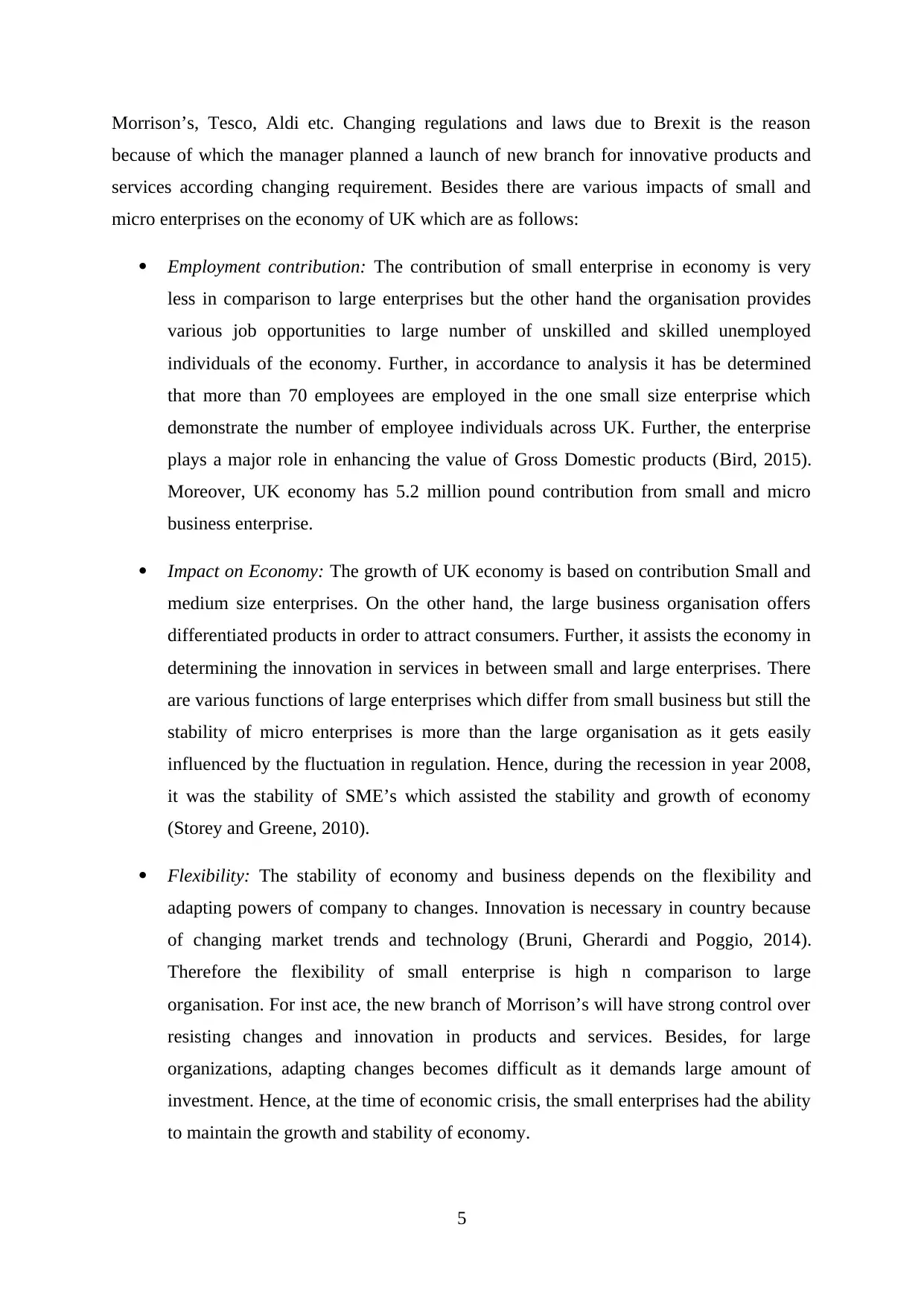
Morrison’s, Tesco, Aldi etc. Changing regulations and laws due to Brexit is the reason
because of which the manager planned a launch of new branch for innovative products and
services according changing requirement. Besides there are various impacts of small and
micro enterprises on the economy of UK which are as follows:
Employment contribution: The contribution of small enterprise in economy is very
less in comparison to large enterprises but the other hand the organisation provides
various job opportunities to large number of unskilled and skilled unemployed
individuals of the economy. Further, in accordance to analysis it has be determined
that more than 70 employees are employed in the one small size enterprise which
demonstrate the number of employee individuals across UK. Further, the enterprise
plays a major role in enhancing the value of Gross Domestic products (Bird, 2015).
Moreover, UK economy has 5.2 million pound contribution from small and micro
business enterprise.
Impact on Economy: The growth of UK economy is based on contribution Small and
medium size enterprises. On the other hand, the large business organisation offers
differentiated products in order to attract consumers. Further, it assists the economy in
determining the innovation in services in between small and large enterprises. There
are various functions of large enterprises which differ from small business but still the
stability of micro enterprises is more than the large organisation as it gets easily
influenced by the fluctuation in regulation. Hence, during the recession in year 2008,
it was the stability of SME’s which assisted the stability and growth of economy
(Storey and Greene, 2010).
Flexibility: The stability of economy and business depends on the flexibility and
adapting powers of company to changes. Innovation is necessary in country because
of changing market trends and technology (Bruni, Gherardi and Poggio, 2014).
Therefore the flexibility of small enterprise is high n comparison to large
organisation. For inst ace, the new branch of Morrison’s will have strong control over
resisting changes and innovation in products and services. Besides, for large
organizations, adapting changes becomes difficult as it demands large amount of
investment. Hence, at the time of economic crisis, the small enterprises had the ability
to maintain the growth and stability of economy.
5
because of which the manager planned a launch of new branch for innovative products and
services according changing requirement. Besides there are various impacts of small and
micro enterprises on the economy of UK which are as follows:
Employment contribution: The contribution of small enterprise in economy is very
less in comparison to large enterprises but the other hand the organisation provides
various job opportunities to large number of unskilled and skilled unemployed
individuals of the economy. Further, in accordance to analysis it has be determined
that more than 70 employees are employed in the one small size enterprise which
demonstrate the number of employee individuals across UK. Further, the enterprise
plays a major role in enhancing the value of Gross Domestic products (Bird, 2015).
Moreover, UK economy has 5.2 million pound contribution from small and micro
business enterprise.
Impact on Economy: The growth of UK economy is based on contribution Small and
medium size enterprises. On the other hand, the large business organisation offers
differentiated products in order to attract consumers. Further, it assists the economy in
determining the innovation in services in between small and large enterprises. There
are various functions of large enterprises which differ from small business but still the
stability of micro enterprises is more than the large organisation as it gets easily
influenced by the fluctuation in regulation. Hence, during the recession in year 2008,
it was the stability of SME’s which assisted the stability and growth of economy
(Storey and Greene, 2010).
Flexibility: The stability of economy and business depends on the flexibility and
adapting powers of company to changes. Innovation is necessary in country because
of changing market trends and technology (Bruni, Gherardi and Poggio, 2014).
Therefore the flexibility of small enterprise is high n comparison to large
organisation. For inst ace, the new branch of Morrison’s will have strong control over
resisting changes and innovation in products and services. Besides, for large
organizations, adapting changes becomes difficult as it demands large amount of
investment. Hence, at the time of economic crisis, the small enterprises had the ability
to maintain the growth and stability of economy.
5
Paraphrase This Document
Need a fresh take? Get an instant paraphrase of this document with our AI Paraphraser
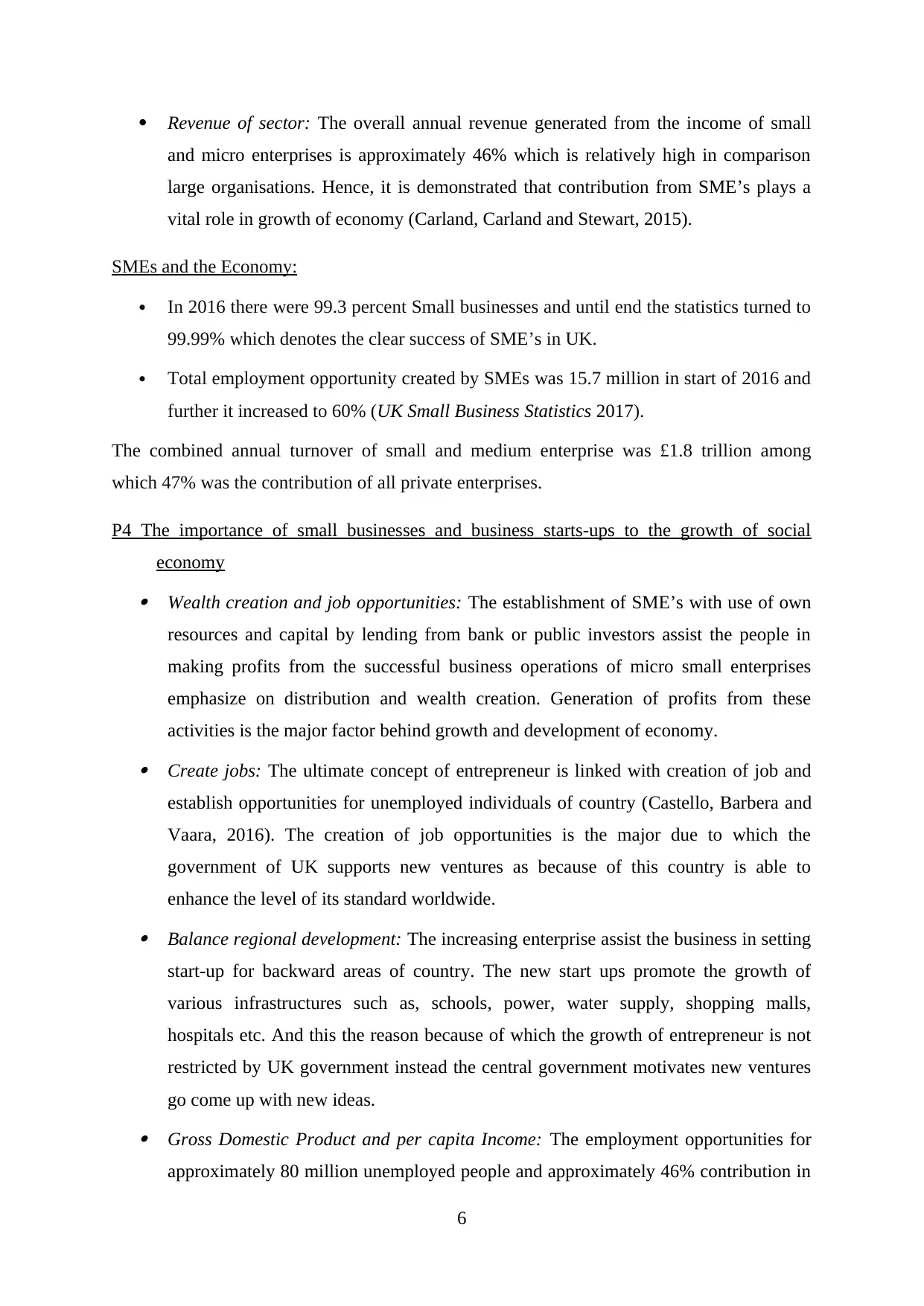
Revenue of sector: The overall annual revenue generated from the income of small
and micro enterprises is approximately 46% which is relatively high in comparison
large organisations. Hence, it is demonstrated that contribution from SME’s plays a
vital role in growth of economy (Carland, Carland and Stewart, 2015).
SMEs and the Economy:
In 2016 there were 99.3 percent Small businesses and until end the statistics turned to
99.99% which denotes the clear success of SME’s in UK.
Total employment opportunity created by SMEs was 15.7 million in start of 2016 and
further it increased to 60% (UK Small Business Statistics 2017).
The combined annual turnover of small and medium enterprise was £1.8 trillion among
which 47% was the contribution of all private enterprises.
P4 The importance of small businesses and business starts-ups to the growth of social
economy Wealth creation and job opportunities: The establishment of SME’s with use of own
resources and capital by lending from bank or public investors assist the people in
making profits from the successful business operations of micro small enterprises
emphasize on distribution and wealth creation. Generation of profits from these
activities is the major factor behind growth and development of economy. Create jobs: The ultimate concept of entrepreneur is linked with creation of job and
establish opportunities for unemployed individuals of country (Castello, Barbera and
Vaara, 2016). The creation of job opportunities is the major due to which the
government of UK supports new ventures as because of this country is able to
enhance the level of its standard worldwide. Balance regional development: The increasing enterprise assist the business in setting
start-up for backward areas of country. The new start ups promote the growth of
various infrastructures such as, schools, power, water supply, shopping malls,
hospitals etc. And this the reason because of which the growth of entrepreneur is not
restricted by UK government instead the central government motivates new ventures
go come up with new ideas. Gross Domestic Product and per capita Income: The employment opportunities for
approximately 80 million unemployed people and approximately 46% contribution in
6
and micro enterprises is approximately 46% which is relatively high in comparison
large organisations. Hence, it is demonstrated that contribution from SME’s plays a
vital role in growth of economy (Carland, Carland and Stewart, 2015).
SMEs and the Economy:
In 2016 there were 99.3 percent Small businesses and until end the statistics turned to
99.99% which denotes the clear success of SME’s in UK.
Total employment opportunity created by SMEs was 15.7 million in start of 2016 and
further it increased to 60% (UK Small Business Statistics 2017).
The combined annual turnover of small and medium enterprise was £1.8 trillion among
which 47% was the contribution of all private enterprises.
P4 The importance of small businesses and business starts-ups to the growth of social
economy Wealth creation and job opportunities: The establishment of SME’s with use of own
resources and capital by lending from bank or public investors assist the people in
making profits from the successful business operations of micro small enterprises
emphasize on distribution and wealth creation. Generation of profits from these
activities is the major factor behind growth and development of economy. Create jobs: The ultimate concept of entrepreneur is linked with creation of job and
establish opportunities for unemployed individuals of country (Castello, Barbera and
Vaara, 2016). The creation of job opportunities is the major due to which the
government of UK supports new ventures as because of this country is able to
enhance the level of its standard worldwide. Balance regional development: The increasing enterprise assist the business in setting
start-up for backward areas of country. The new start ups promote the growth of
various infrastructures such as, schools, power, water supply, shopping malls,
hospitals etc. And this the reason because of which the growth of entrepreneur is not
restricted by UK government instead the central government motivates new ventures
go come up with new ideas. Gross Domestic Product and per capita Income: The employment opportunities for
approximately 80 million unemployed people and approximately 46% contribution in
6
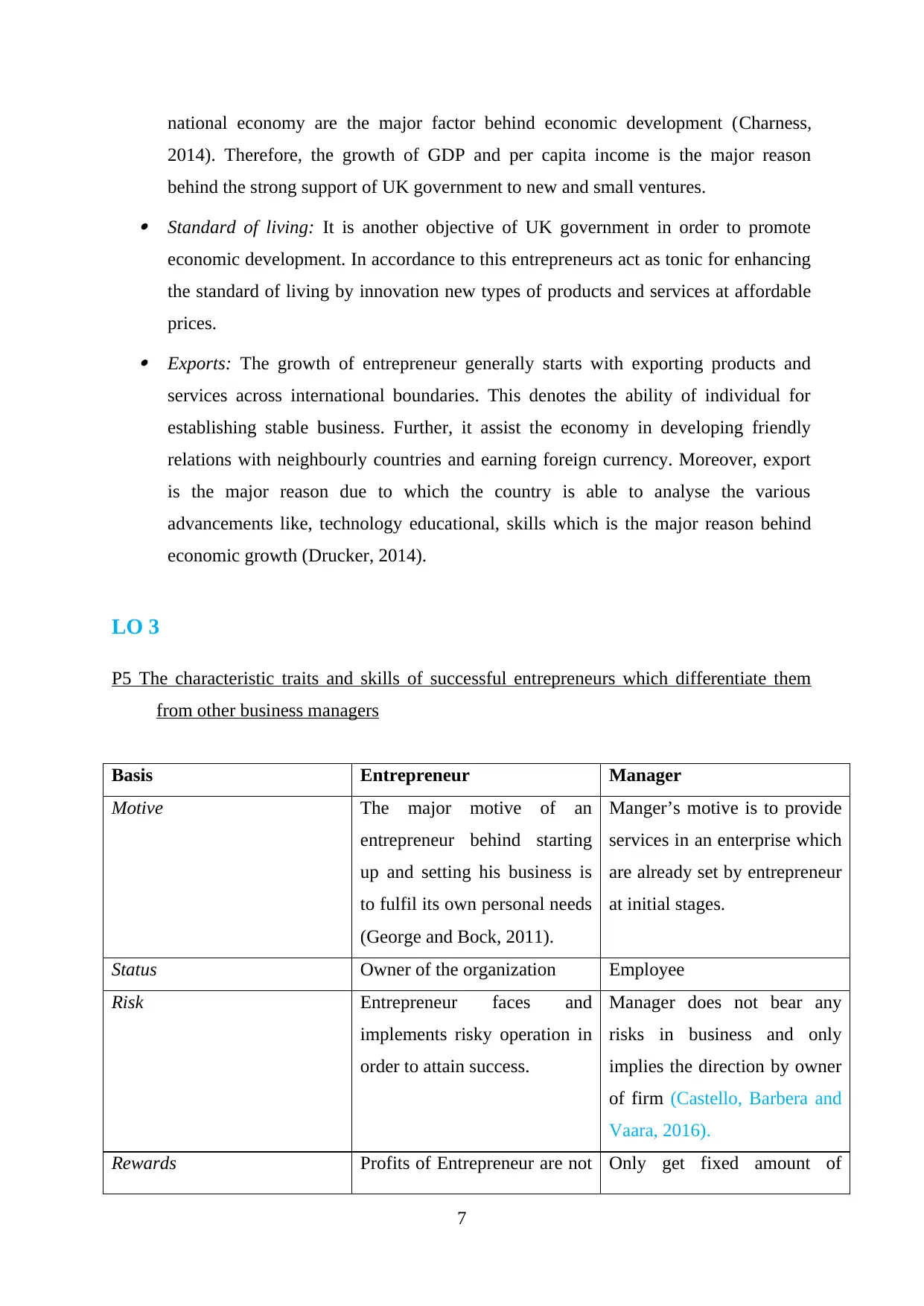
national economy are the major factor behind economic development (Charness,
2014). Therefore, the growth of GDP and per capita income is the major reason
behind the strong support of UK government to new and small ventures. Standard of living: It is another objective of UK government in order to promote
economic development. In accordance to this entrepreneurs act as tonic for enhancing
the standard of living by innovation new types of products and services at affordable
prices. Exports: The growth of entrepreneur generally starts with exporting products and
services across international boundaries. This denotes the ability of individual for
establishing stable business. Further, it assist the economy in developing friendly
relations with neighbourly countries and earning foreign currency. Moreover, export
is the major reason due to which the country is able to analyse the various
advancements like, technology educational, skills which is the major reason behind
economic growth (Drucker, 2014).
LO 3
P5 The characteristic traits and skills of successful entrepreneurs which differentiate them
from other business managers
Basis Entrepreneur Manager
Motive The major motive of an
entrepreneur behind starting
up and setting his business is
to fulfil its own personal needs
(George and Bock, 2011).
Manger’s motive is to provide
services in an enterprise which
are already set by entrepreneur
at initial stages.
Status Owner of the organization Employee
Risk Entrepreneur faces and
implements risky operation in
order to attain success.
Manager does not bear any
risks in business and only
implies the direction by owner
of firm (Castello, Barbera and
Vaara, 2016).
Rewards Profits of Entrepreneur are not Only get fixed amount of
7
2014). Therefore, the growth of GDP and per capita income is the major reason
behind the strong support of UK government to new and small ventures. Standard of living: It is another objective of UK government in order to promote
economic development. In accordance to this entrepreneurs act as tonic for enhancing
the standard of living by innovation new types of products and services at affordable
prices. Exports: The growth of entrepreneur generally starts with exporting products and
services across international boundaries. This denotes the ability of individual for
establishing stable business. Further, it assist the economy in developing friendly
relations with neighbourly countries and earning foreign currency. Moreover, export
is the major reason due to which the country is able to analyse the various
advancements like, technology educational, skills which is the major reason behind
economic growth (Drucker, 2014).
LO 3
P5 The characteristic traits and skills of successful entrepreneurs which differentiate them
from other business managers
Basis Entrepreneur Manager
Motive The major motive of an
entrepreneur behind starting
up and setting his business is
to fulfil its own personal needs
(George and Bock, 2011).
Manger’s motive is to provide
services in an enterprise which
are already set by entrepreneur
at initial stages.
Status Owner of the organization Employee
Risk Entrepreneur faces and
implements risky operation in
order to attain success.
Manager does not bear any
risks in business and only
implies the direction by owner
of firm (Castello, Barbera and
Vaara, 2016).
Rewards Profits of Entrepreneur are not Only get fixed amount of
7
⊘ This is a preview!⊘
Do you want full access?
Subscribe today to unlock all pages.

Trusted by 1+ million students worldwide
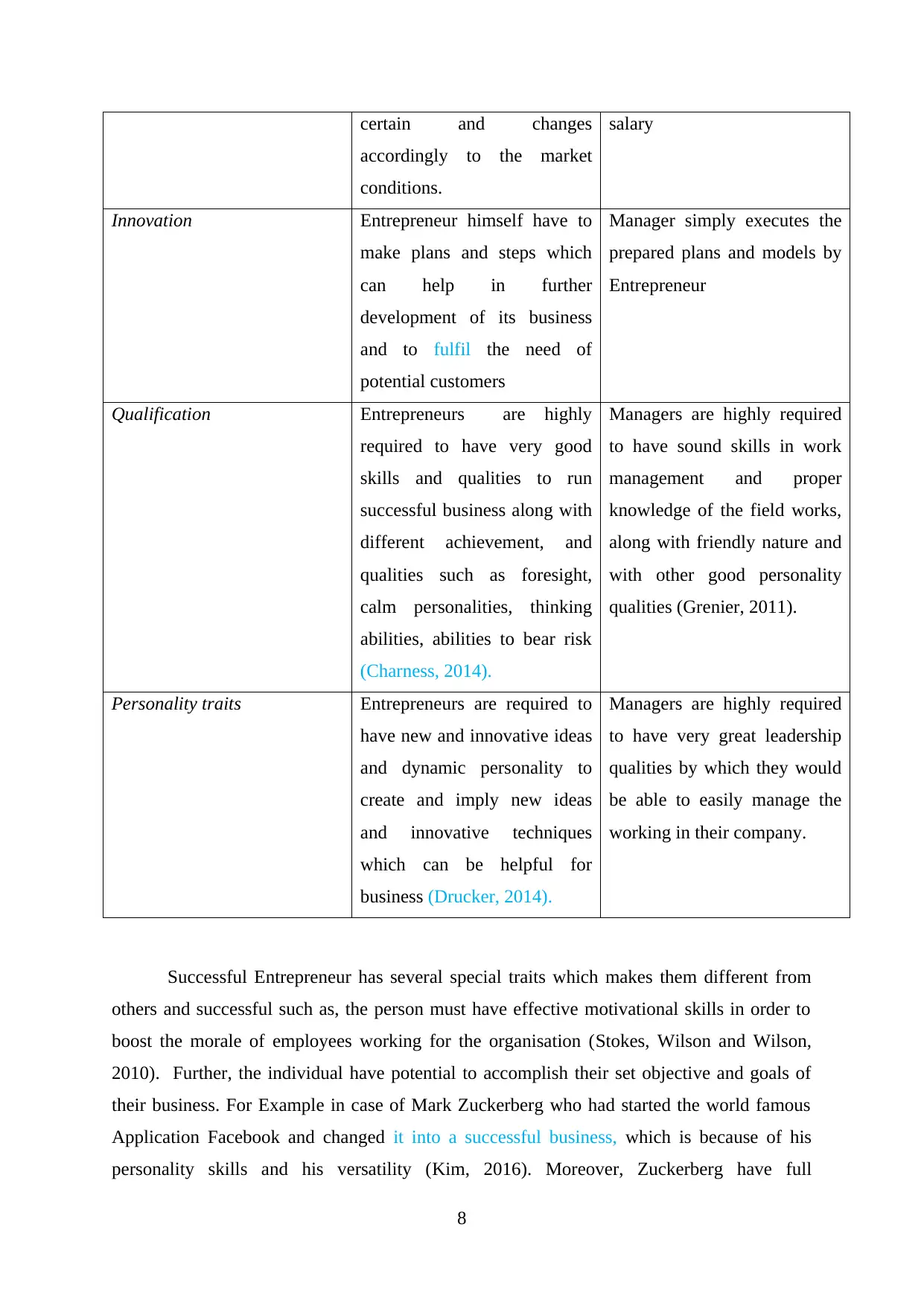
certain and changes
accordingly to the market
conditions.
salary
Innovation Entrepreneur himself have to
make plans and steps which
can help in further
development of its business
and to fulfil the need of
potential customers
Manager simply executes the
prepared plans and models by
Entrepreneur
Qualification Entrepreneurs are highly
required to have very good
skills and qualities to run
successful business along with
different achievement, and
qualities such as foresight,
calm personalities, thinking
abilities, abilities to bear risk
(Charness, 2014).
Managers are highly required
to have sound skills in work
management and proper
knowledge of the field works,
along with friendly nature and
with other good personality
qualities (Grenier, 2011).
Personality traits Entrepreneurs are required to
have new and innovative ideas
and dynamic personality to
create and imply new ideas
and innovative techniques
which can be helpful for
business (Drucker, 2014).
Managers are highly required
to have very great leadership
qualities by which they would
be able to easily manage the
working in their company.
Successful Entrepreneur has several special traits which makes them different from
others and successful such as, the person must have effective motivational skills in order to
boost the morale of employees working for the organisation (Stokes, Wilson and Wilson,
2010). Further, the individual have potential to accomplish their set objective and goals of
their business. For Example in case of Mark Zuckerberg who had started the world famous
Application Facebook and changed it into a successful business, which is because of his
personality skills and his versatility (Kim, 2016). Moreover, Zuckerberg have full
8
accordingly to the market
conditions.
salary
Innovation Entrepreneur himself have to
make plans and steps which
can help in further
development of its business
and to fulfil the need of
potential customers
Manager simply executes the
prepared plans and models by
Entrepreneur
Qualification Entrepreneurs are highly
required to have very good
skills and qualities to run
successful business along with
different achievement, and
qualities such as foresight,
calm personalities, thinking
abilities, abilities to bear risk
(Charness, 2014).
Managers are highly required
to have sound skills in work
management and proper
knowledge of the field works,
along with friendly nature and
with other good personality
qualities (Grenier, 2011).
Personality traits Entrepreneurs are required to
have new and innovative ideas
and dynamic personality to
create and imply new ideas
and innovative techniques
which can be helpful for
business (Drucker, 2014).
Managers are highly required
to have very great leadership
qualities by which they would
be able to easily manage the
working in their company.
Successful Entrepreneur has several special traits which makes them different from
others and successful such as, the person must have effective motivational skills in order to
boost the morale of employees working for the organisation (Stokes, Wilson and Wilson,
2010). Further, the individual have potential to accomplish their set objective and goals of
their business. For Example in case of Mark Zuckerberg who had started the world famous
Application Facebook and changed it into a successful business, which is because of his
personality skills and his versatility (Kim, 2016). Moreover, Zuckerberg have full
8
Paraphrase This Document
Need a fresh take? Get an instant paraphrase of this document with our AI Paraphraser
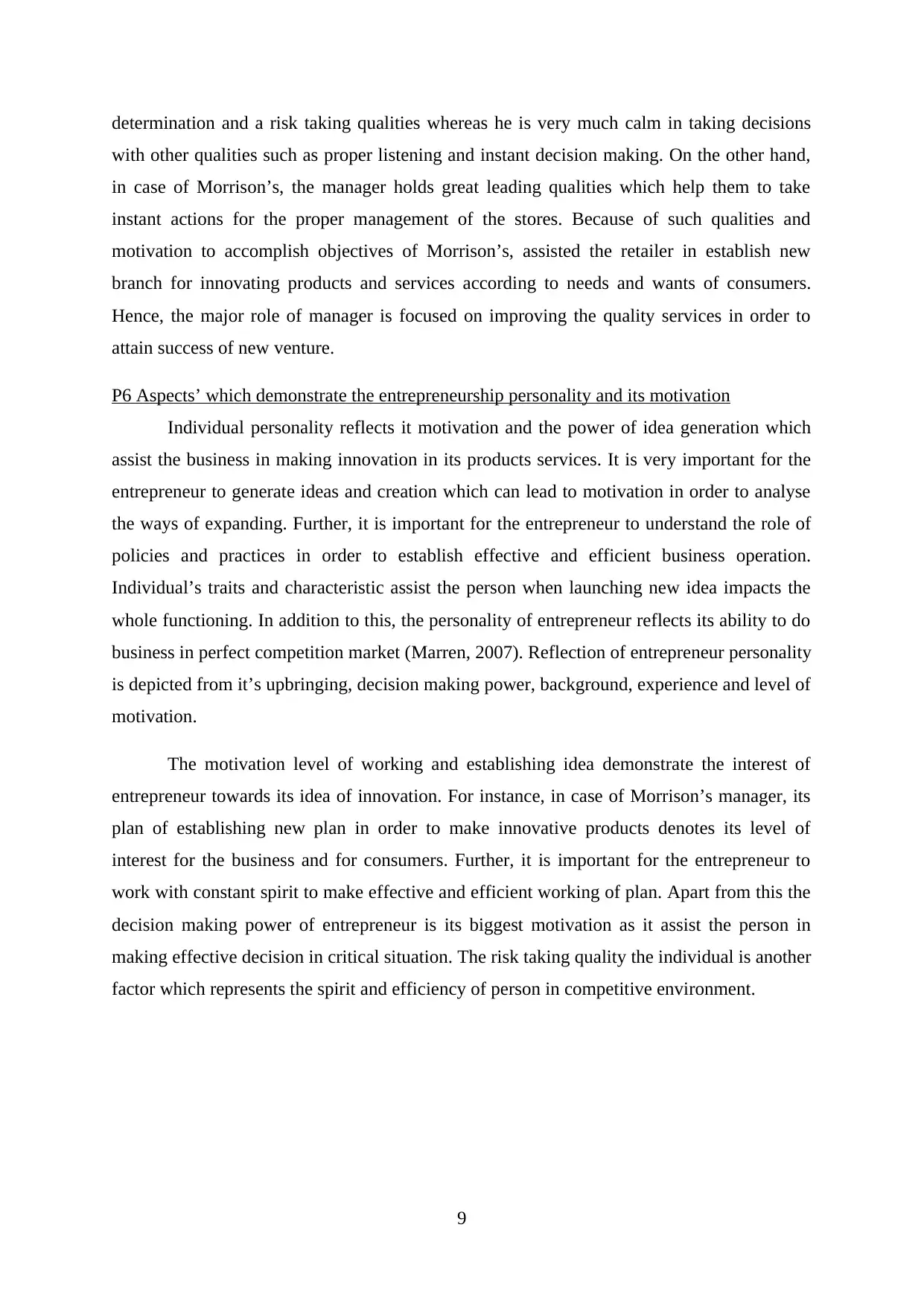
determination and a risk taking qualities whereas he is very much calm in taking decisions
with other qualities such as proper listening and instant decision making. On the other hand,
in case of Morrison’s, the manager holds great leading qualities which help them to take
instant actions for the proper management of the stores. Because of such qualities and
motivation to accomplish objectives of Morrison’s, assisted the retailer in establish new
branch for innovating products and services according to needs and wants of consumers.
Hence, the major role of manager is focused on improving the quality services in order to
attain success of new venture.
P6 Aspects’ which demonstrate the entrepreneurship personality and its motivation
Individual personality reflects it motivation and the power of idea generation which
assist the business in making innovation in its products services. It is very important for the
entrepreneur to generate ideas and creation which can lead to motivation in order to analyse
the ways of expanding. Further, it is important for the entrepreneur to understand the role of
policies and practices in order to establish effective and efficient business operation.
Individual’s traits and characteristic assist the person when launching new idea impacts the
whole functioning. In addition to this, the personality of entrepreneur reflects its ability to do
business in perfect competition market (Marren, 2007). Reflection of entrepreneur personality
is depicted from it’s upbringing, decision making power, background, experience and level of
motivation.
The motivation level of working and establishing idea demonstrate the interest of
entrepreneur towards its idea of innovation. For instance, in case of Morrison’s manager, its
plan of establishing new plan in order to make innovative products denotes its level of
interest for the business and for consumers. Further, it is important for the entrepreneur to
work with constant spirit to make effective and efficient working of plan. Apart from this the
decision making power of entrepreneur is its biggest motivation as it assist the person in
making effective decision in critical situation. The risk taking quality the individual is another
factor which represents the spirit and efficiency of person in competitive environment.
9
with other qualities such as proper listening and instant decision making. On the other hand,
in case of Morrison’s, the manager holds great leading qualities which help them to take
instant actions for the proper management of the stores. Because of such qualities and
motivation to accomplish objectives of Morrison’s, assisted the retailer in establish new
branch for innovating products and services according to needs and wants of consumers.
Hence, the major role of manager is focused on improving the quality services in order to
attain success of new venture.
P6 Aspects’ which demonstrate the entrepreneurship personality and its motivation
Individual personality reflects it motivation and the power of idea generation which
assist the business in making innovation in its products services. It is very important for the
entrepreneur to generate ideas and creation which can lead to motivation in order to analyse
the ways of expanding. Further, it is important for the entrepreneur to understand the role of
policies and practices in order to establish effective and efficient business operation.
Individual’s traits and characteristic assist the person when launching new idea impacts the
whole functioning. In addition to this, the personality of entrepreneur reflects its ability to do
business in perfect competition market (Marren, 2007). Reflection of entrepreneur personality
is depicted from it’s upbringing, decision making power, background, experience and level of
motivation.
The motivation level of working and establishing idea demonstrate the interest of
entrepreneur towards its idea of innovation. For instance, in case of Morrison’s manager, its
plan of establishing new plan in order to make innovative products denotes its level of
interest for the business and for consumers. Further, it is important for the entrepreneur to
work with constant spirit to make effective and efficient working of plan. Apart from this the
decision making power of entrepreneur is its biggest motivation as it assist the person in
making effective decision in critical situation. The risk taking quality the individual is another
factor which represents the spirit and efficiency of person in competitive environment.
9
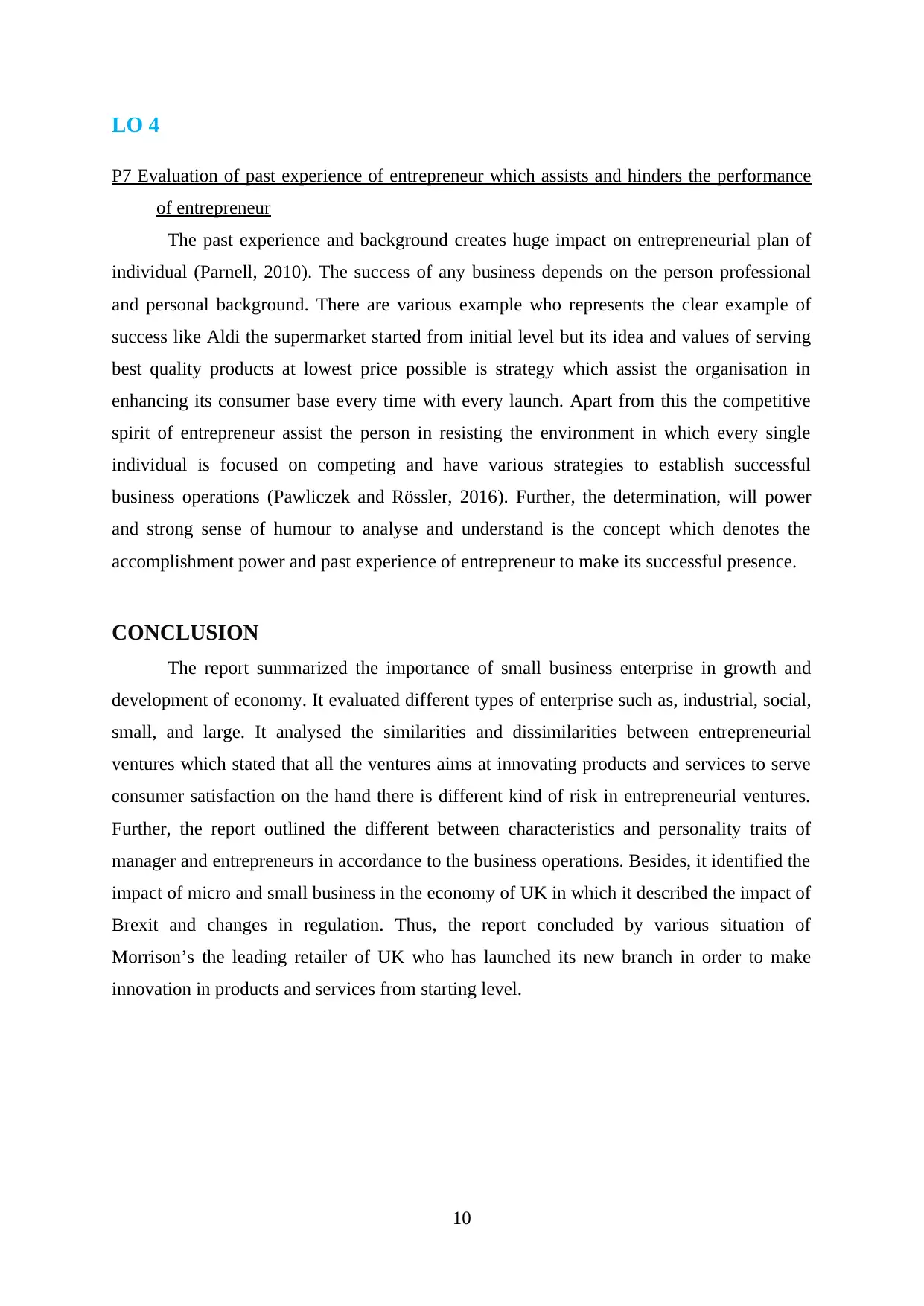
LO 4
P7 Evaluation of past experience of entrepreneur which assists and hinders the performance
of entrepreneur
The past experience and background creates huge impact on entrepreneurial plan of
individual (Parnell, 2010). The success of any business depends on the person professional
and personal background. There are various example who represents the clear example of
success like Aldi the supermarket started from initial level but its idea and values of serving
best quality products at lowest price possible is strategy which assist the organisation in
enhancing its consumer base every time with every launch. Apart from this the competitive
spirit of entrepreneur assist the person in resisting the environment in which every single
individual is focused on competing and have various strategies to establish successful
business operations (Pawliczek and Rössler, 2016). Further, the determination, will power
and strong sense of humour to analyse and understand is the concept which denotes the
accomplishment power and past experience of entrepreneur to make its successful presence.
CONCLUSION
The report summarized the importance of small business enterprise in growth and
development of economy. It evaluated different types of enterprise such as, industrial, social,
small, and large. It analysed the similarities and dissimilarities between entrepreneurial
ventures which stated that all the ventures aims at innovating products and services to serve
consumer satisfaction on the hand there is different kind of risk in entrepreneurial ventures.
Further, the report outlined the different between characteristics and personality traits of
manager and entrepreneurs in accordance to the business operations. Besides, it identified the
impact of micro and small business in the economy of UK in which it described the impact of
Brexit and changes in regulation. Thus, the report concluded by various situation of
Morrison’s the leading retailer of UK who has launched its new branch in order to make
innovation in products and services from starting level.
10
P7 Evaluation of past experience of entrepreneur which assists and hinders the performance
of entrepreneur
The past experience and background creates huge impact on entrepreneurial plan of
individual (Parnell, 2010). The success of any business depends on the person professional
and personal background. There are various example who represents the clear example of
success like Aldi the supermarket started from initial level but its idea and values of serving
best quality products at lowest price possible is strategy which assist the organisation in
enhancing its consumer base every time with every launch. Apart from this the competitive
spirit of entrepreneur assist the person in resisting the environment in which every single
individual is focused on competing and have various strategies to establish successful
business operations (Pawliczek and Rössler, 2016). Further, the determination, will power
and strong sense of humour to analyse and understand is the concept which denotes the
accomplishment power and past experience of entrepreneur to make its successful presence.
CONCLUSION
The report summarized the importance of small business enterprise in growth and
development of economy. It evaluated different types of enterprise such as, industrial, social,
small, and large. It analysed the similarities and dissimilarities between entrepreneurial
ventures which stated that all the ventures aims at innovating products and services to serve
consumer satisfaction on the hand there is different kind of risk in entrepreneurial ventures.
Further, the report outlined the different between characteristics and personality traits of
manager and entrepreneurs in accordance to the business operations. Besides, it identified the
impact of micro and small business in the economy of UK in which it described the impact of
Brexit and changes in regulation. Thus, the report concluded by various situation of
Morrison’s the leading retailer of UK who has launched its new branch in order to make
innovation in products and services from starting level.
10
⊘ This is a preview!⊘
Do you want full access?
Subscribe today to unlock all pages.

Trusted by 1+ million students worldwide
1 out of 14
Related Documents
Your All-in-One AI-Powered Toolkit for Academic Success.
+13062052269
info@desklib.com
Available 24*7 on WhatsApp / Email
![[object Object]](/_next/static/media/star-bottom.7253800d.svg)
Unlock your academic potential
Copyright © 2020–2025 A2Z Services. All Rights Reserved. Developed and managed by ZUCOL.





